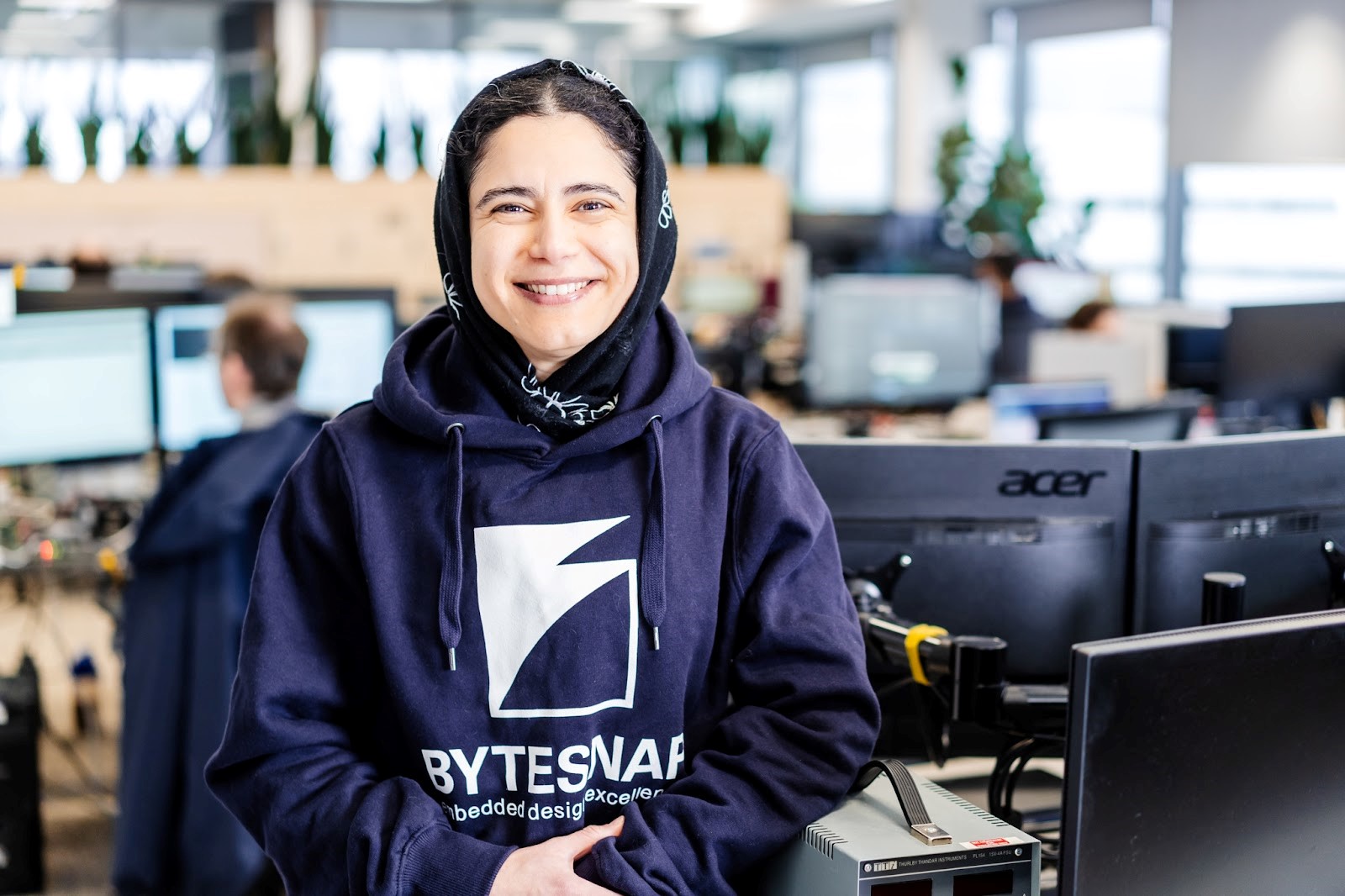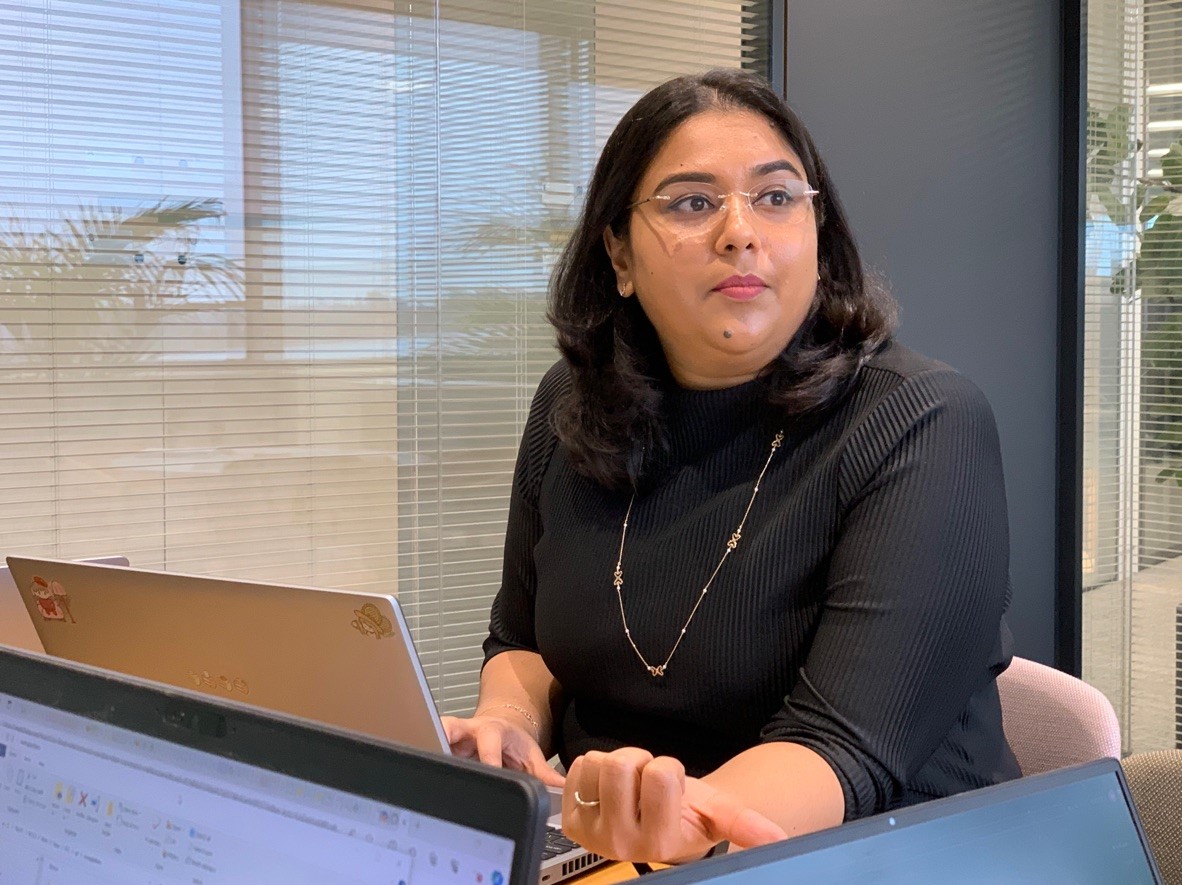This IWD two successful engineers share their stories and insights
To mark International Women’s Day, two female electronics engineers, Manjula Balasubramanian, a software engineer from electric charging firm Versinetic, and Magda Abdelbasit Abbas, an electronics engineer from electronics consultancy ByteSnap Design, discuss their respective experiences in the industry and share their tips for women wanting to pursue a similar path.

Magda Abdelbasit Abbas, ByteSnap Design, Electronics Engineer
Both engineers became interested in electronics around the age of 14. When Magda’s brother, four years her senior, took up mechanical engineering, she thought it would be a good career option for her too, especially as it would allow her to use mathematics. Meanwhile, a 14-year-old Manjula started playing with free coding language programs and quickly became hooked. Her curiosity led her to develop a love of coding and to become the first person in her family to attend university.
Magda switched from being a teaching assistant to her first engineering job. Meanwhile, Manjula was recruited at university. Interestingly, most of her peers went into IT roles and earned more in their early years than Manjula. Bravely, she decided to tread the lesser-known and, at the time, lesser-paid path of electronic engineering due to her childhood passion, which is now in demand and equally well paid.
Women make up 16.5% of all engineers, compared to 10.5% reported in 2010, so there is still some ground to make up. Both engineers stress the importance of introducing engineering early on.
Magda states: “Science and maths are important at an early age as well as showing girls successful female engineers to encourage them to consider engineering as a career.”
Manjula has already been introducing her daughter to engineering toys to spark her imagination. She continues: “We need to break the stereotype that boys and girls play with different toys now. My nine-year-old daughter loves the coding game and circuit board that I’ve given her.”
When it comes to career role models, Manjula cites a senior manager during her time at GE. She recalls how she was “the only woman at leadership level in her company, had her career and children” which inspired Manjula to believe that she could have it all too. Magda hasn’t encountered a senior female in an electronics engineer role, but she hopes that future generations will turn the tide. However, she also found role models in Professors Alison Noble and Eleanor Stride, whom she encountered during her time doing her PhD at Oxford University. Magda admires their success in academia and the startups that they’ve since launched.
While an interest in engineering is one part of encouraging more women into engineering, Magda and Manjula cited that there were particular skills and attributes needed to succeed. Magda states that being confident in one's ability and attention to detail were valued.
“It’s crucial to double-check everything and understand how every decision you make as an engineer may impact the overall product. For example, you may put in a component that consumes too much power and sucks the device battery. With engineering, the devil is in the details.” She also speaks of getting on top of technical advances.

Manjula Balasubramanian, Versinetic, Software Engineer
Manjula agrees. The tech industry is so fast-paced that programmes become obsolete straightaway.
“Software that I worked with last year will not exist in a couple of years. It changes rapidly and so upskill, upskill, upskill is my advice. There are so many available sources for upskilling such as Udemy and YouTube – you don’t even need to register at a formal institution anymore.”
Looking back at their time in the industry, and if they would do things differently, Magda speaks of her PhD stating that when she returned to hardware engineering, she had to take on a junior position but does not regret her experience gained in the biomedical world.
Manjula had to take a career break due to a move to Paris. She was very aware that it would be difficult to re-enter the professional world if her break took too long, and so after a year, she put her efforts into securing a job in France while juggling the demands of her family. As it transpired, it would be another seven years and a move to the UK, a returner-friendly job market, that led to her landing her present job with Versinetic.
“Had I known I would land a great job again in seven years, I would have not felt so much guilt and concern about my prospects and enjoyed Paris more.”
Manjula says that there is still a stereotype in India where in a previous role, managers were reticent to give women important projects or hire them into demanding roles as they felt their focus may be on their families currently or in the future rather than their work. Positively, Magda has not encountered these obstacles or stereotypes at work because of her gender.
Manjula believes that while these perceptions still exist, they are shifting and improving now. “At one point, women had to choose career or family,” she says. Covid has helped with career flexibility that women, often still the main caregivers in a family, need. “They can now consult, and work more flexible hours in engineering than previously,” she continues.
From her own experience in the UK, Manjula now sees a place where females that take career breaks and return to work are now accepted and welcomed back. To this end, she is always very upfront about her seven-year CV gap, wanting to demonstrate to her peers that taking a break is nothing to be ashamed of. She advises anyone in the same position re-entering work to, “never give up, keep forging ahead – get a mentor and upskill if you need to; but above all, believe in yourself.”
For young women considering a career in software engineering, Manjula says: “It’s a deeply demanding job and it keeps you on your toes. Every day is different, one day nothing makes sense and the next day, it all falls into place. If you are prepared for the challenges, then go for it!”
Magda advises: “not pigeonholing yourself and having the mindset of always learning new things. This way you can pivot and change as your career prospects and circumstances change. As an electronics engineer, I can work with C and Python language test scripts. I know enough to use them to do it myself and not have to ask someone else to do it. This has diversified my daily work.”
It is clear when speaking with these women how passionate they are about engineering.
Manjula says, “I love that the impossible is at my fingertips, I can create anything with engineering. We can imagine and program everything to do what we want. It’s extraordinary how a simple microprocessor can do so many things – the possibilities fascinate me and keep me going.”
Magda concludes: “engineering is the profession that builds daily life, from food appliances, communications, and complex medical devices like pacemakers that help people to live. Every device relies on engineering – I’m excited to be a part of that.”










